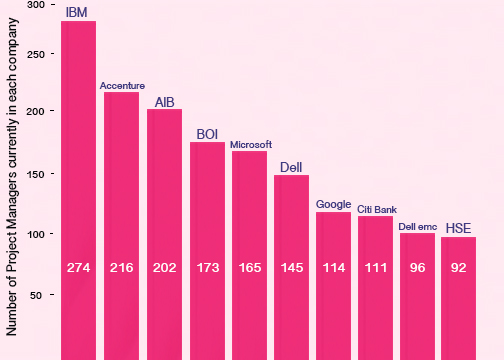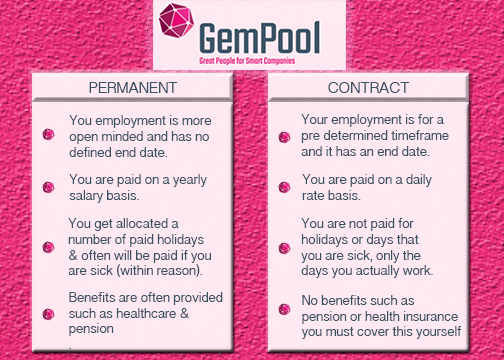
So, You Want to be a Project Manager?
Posted on:
IT Jobs and Recruitment Insights
The world of Project Management
Project Management is a massive area within almost any company or industry within today’s world. Be it on a construction site managing the build of a new hotel or in a tech startup creating the latest analytics tool - in order for a project to be completed, you first need a Project Manager. Seems simple, right? In fact, there is nothing simple about being a Project Manager. This role requires you to be an exceptionally organized individual, have a strong knowledge of the area of expertise your project falls into, and also have the ability to make informed decisions as to how, when, where, what and why something is being done.
To understand what a Project Manager does, firstly we need to understand what the definition of a project is. A project has a beginning and an end, so at some point in the development of the project, it gets completed. It has a definitive outcome. For example, the hotel gets built or the software application gets to a stage where it is fully functioning and ready to go to market. The majority of the time these projects have a budget in terms of how much can be spent to complete it, as well as a time frame in which it needs to be completed by. But then why do we need a Project Manager?
We need a Project Manager because no project is simple. It needs to go from A to Z and then there is all that happens in between, this is where the Project Manager comes into play and his/her role is essential in order for the project to be successful. Yes, you already have a budget of 10 million to build the new hotel, but how much of that gets spent on equipment? Who is going to use the equipment? Where do we get the equipment? What if we spend too much and don’t have enough for labour? What if the equipment isn’t of good quality? These are all very relevant questions that an effective Project Manager should be asking themselves while deciding on the Project Plan as well as the resources that they will require.
One similarity that all projects have is that they have a Scope, and this Scope of Project is essentially what needs to be completed. If you are asked to deliver a bicycle with one wheel and you deliver one with 2 wheels, the features and functions of the Scope have not been adhered to. Other than that, projects are always different and will require various skill sets from different people to be completed. A software application may require Front End and Backend Developers to create it, a Product Owner to write the user stories and define the requirements for the app, a QA Tester to ensure there are no defects or issues with it and a Project Manager to ensure all of the above gets done on time, within budget and subject to the requirements defined by the customer/client. These are all vital aspects of the application, but the Project Manager is essentially responsible for the overall successful delivery of the project.
Project Management in IT is a section within the world of technology that I have found myself recruiting for mostly. It has become a massive area of interest for me, and hopefully in time - an area of expertise. Although, as mentioned above, a project has a beginning and an end, companies can have several projects on the go at once so often we see Project Managers remain within the same company for many years and build strong relationships with their clients. Conversely, some clients might only have one particular project at hand such as a one-time digital transformation, meaning there is only a need for a Project Manager for that particular time. This variation in demand has allowed for numerous types of Project Managers to emerge through the industry and companies being able to get really specific when it comes to what they require for a particular project. This then has created a demand for both contract and permanent Project managers in the market, and both have their pro’s and con’s.
Contract and Permanent
Below is a chart that shows the differences between contract and permanent roles. These are not specific to Project Management but often we see people with this job title preferring either one or the other, for various different reasons. There are pros and cons to both, for example there is higher earning potential with contract work but there may be little or no benefits.
Important skills of a Project Manager
There are numerous skills that are necessary in order to be a successful Project Manager. Here I have compiled a list of 5 that I think are the most important if you are to be truly great at doing this job.
Leadership
Come on...seriously? Yes. Although this one might seem obvious, there are a lot of Project Managers who are not great leaders. The job requires a lot of organization and task management, but it also requires you to manage people within your team too. When somebody is having issues or trouble completing their tasks, it is you that needs to find out what the problem is and help them get the tools/help they need in order to adjust. Likewise, if somebody is underperforming, you need to be able to motivate them and lead by example, because that is what great leaders do. This does not mean that Project Managers know everything there is to know about the project at hand, in fact quite the opposite. A Project Manager should however know everything that needs to be done, and you have been put in charge of this team/teams in order for this to be made possible.
Communication
This ties in a little with the above skill. In order to effectively lead, realistically you need to be able to communicate. If we go back to the software application example, think about how many different teams it takes to get this built. All these people need to be able to communicate information to one another, be it the stakeholders, development team, customers or contractors and it is your job to make sure of this. If a customer wants a change made to the user interface of the App, you need to make sure you understand what this change requires AND be able to communicate this effectively to the development team. This is where having strong UI Design would also come in handy, and often we do see people who have many years of experience in an area - move on to be Project Managers within that space. Sometimes people within the same project are not in the same country and this is where it can get tricky. In this instance, as a PM you need to decide what tools are needed in order to communicate and also arrange the times that are best to speak if there are obstacles such as different time zones etc, which leads us to our next skill.
Scheduling
Projects can be large or small, but usually in the IT sector they are at the very least a couple of months long. This means that there are numerous mini-projects within this time period and this is where you need to be really organized in order to get them done. A Project Schedule is extremely important and pretty much breaks everything up into little tasks within a timeframe. This allows you to place importance on areas that might need more attention than others, and also helps your team stay on track in terms of Milestones, Activities & Deliverables - Usually all within a certain period of time.
Risk Management
There are always going to be issues and risks throughout a project and part of your role is to try and identify these before they arise in the first place. It’s tough to anticipate cement not arriving for the foundation of the hotel you’re building, but you should have a process in place in case this does happen - such as having a backup supplier. You need to assess every possible risk that you can think of before you begin a project, that way you are organized in case anything goes wrong, which at some stage it almost certainly will!
Cost Management
You are in charge of managing this project, and this includes managing the money and costs. It’s certainly tough to stay within the budget that has been set out and you have to decide how much of the budget needs to be spent on various aspects of the project. This can be tough when things go wrong and sometimes needs to be revisited mid-way as there often might need to be adjustments made. For the most part you need to stay firm on budgets that you have set out, and being good at negotiating is also a great skill to have when it comes to working with the various suppliers too.
Top 10 companies hiring Project Managers at the moment:
Take a look at this Chart which shows the top ten employers of Project Managers currently in Ireland. The common trend is that these are all large organizations (naturally) and they are in the areas of Banking, Financial Services and Technology.

Data shows that when the words “Project Manager” (or any variations of the job title) are used in combination with the word “IT” that there is a total of 15,342 PM’s in the country. Of that number, 2,508 are ‘Open to opportunities’ which is 16.3%. This number may also be affected by Covid 19 and the uncertainty of the market. In general, Project Managers are highly sought after and has hence meant a wealth of opportunity in this area. This also means that companies have strong options when it comes to making hiring decisions, and this has made it a highly competitive market also.
What are the salaries offered to Project Managers?
Salary is, of course, a massively important aspect when it comes to deciding on a new role. For some people it isn’t the be all and end all, and there can be different reasons for accepting higher/lower salaries than perhaps what you might usually look for. Factors include: benefits, distance from home, the types of projects you are working on, the size of the teams, specific role within those teams, company culture, growth opportunities, educational facilities and much more. The point is, you might be presented with the most amazing opportunity in the world, one which you’ve always dreamt of securing, but it is an hour and twenty minutes away. This would seem fine at the start, but eventually the 3 hours daily travel is going to catch up on you. This is just one of many examples as to why you need to consider many other aspects of a job before becoming too focused on the salary.
Below is a small chart which shows the average salaries of a Project Manager in Ireland, in the IT sector based on years of experience only. There are many other factors to consider besides your years of experience such as education, certificates and exceptional performance, but a lot of the time it does in fact come down to the experience you have attained.

Career Progression?
Project Management is a long road of progression, and as you can see by the salary ranges here, it can also bring you a nice package in terms of salary and benefits. Gaining years of valuable experience as well as obtaining Certifications such as the PMP or Prince2 all help you progress up the project management ladder, and really these are the steps it takes to become an accomplished Project Manager.
Often we see well established Project Managers go on to be Program Managers, and a Program Manager does a lot of the similar tasks a Project Manager would do except on a higher/larger level. A Program Manager might be responsible for managing 6 Project Managers who each have their own important projects to complete, and he/she is responsible for the overall program’s completion.
When we look at all the desired skills of a Project Manager - Leadership, Communication, Risk Management etc. - the commonalities in traits can be seen also in various other leadership type roles. Business Owners, Directors, Head of Departments all similarly need to be just as organized and well structured as a PM and, although they may perform quite different tasks, the characteristics he/she will have inbuilt are the same. These are all areas that Project Manager’s have gone on to explore, and are certainly career paths you should be exploring if you are looking for the next move in terms of seniority.
What is the point of this article and how can I help?
This blog was compiled based on my experience as a recruiter in the area IT Project Management in Ireland as well as insights gained through platforms such as LinkedIn. My aim with this is to inform anybody interested in becoming a Project Manager of what lies in store, should they pursue this exciting career.
Furthermore, I hope that anybody already in this field who is looking at progressing their career might get a better idea as to what options they have. Maybe you should go for that new job you’ve been scouting, or apply to that company you didn’t realize has as many Project Managers as they actually do.
If you are a Project Manager looking at changing jobs, or perhaps you just want to share your thoughts on the market, feel free to get in touch via email or phone and I would be more than happy to try and help. You can also check out our Project Managemant's jobs page and apply if you find anything suitable. Also, I am not a Project Manager... so there is certainly a lot more to be learned on my end so if you want to catch up to teach me a thing or two about this field, even better! If you need any help, get in touch by emailing lee.garvin@gempool.ie.
“Aspire to Inspire before you Expire” - Eugene Bell Jr






